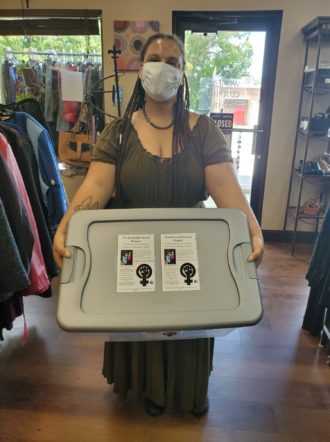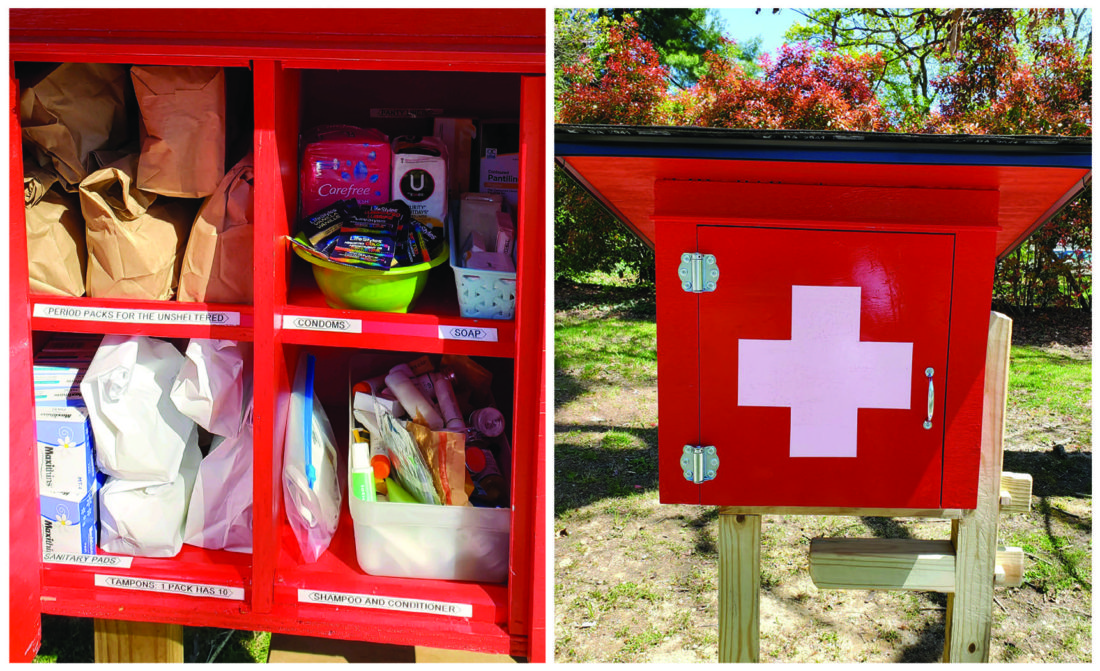There is no typical day in a school nurse’s office; it can often be a blur of Band-Aids, ice packs and heating pads. But every day at T.C. Roberson High School, some students pop in to get menstrual hygiene products, says school nurse Taylor Arace.
“Every day, we probably give out [products to] at least 10 kids,” Arace says, noting that the student population at T.C. Roberson numbers about 1,500. “We go through a lot of supplies”
Some students need a tampon or pad because they forgot their own at home. For others, their period arrived unexpectedly or heavier than usual. But other students rely on nurses like Arace for menstrual hygiene products because of period poverty: A box of tampons or pads is cost-prohibitive for them to buy themselves.
Period poverty is the inability to afford sufficient disposable menstrual hygiene products, including pads, tampons, panty liners and sanitary wipes. Without access to these products, a person may bunch up toilet paper or paper towels in their underwear instead and risk staining their clothes. Arace notes that students who’ve bled through their clothes leave before the school day has ended “all the time.”
And those who use sanitary products for longer than recommended risk potentially lethal toxic shock syndrome (from tampons) or urinary tract infection, Arace says.
Period poverty may not be visible to those it does not effect. But a survey of low-income women found that nearly two-thirds were unable to buy the menstrual hygiene products they needed at some point in the previous year, according to a 2019 study in the journal Obstetrics & Gynecology. Over 20% women surveyed said this problem was a monthly occurrence.
Among teenage U.S. students, nearly a quarter struggle to access menstrual hygiene products, according to State of The Period 2021, a report by the nonprofit PERIOD. and Thinx, which makes washable period-absorbing underwear.
People who work on the issue in Western North Carolina agree that period poverty is more widespread than it may seem due to the cultural stigmas of both poverty and menstruation. And financial issues wrought by the COVID-19 pandemic have made menstrual hygiene products even more inaccessible for many.
Asheville’s period activists
Asheville has two volunteer groups working to address local unmet menstrual hygiene needs.
The Asheville Period Project formed at Kenilworth Presbyterian Church in 2014 among members of the women’s ministry. The group began with collecting items like baby products, soap and shampoo to donate to those in need. But Katie Adams, the project’s founder, says recipients consistently asked for more menstrual products. She calls period poverty “a conversation that people weren’t having in our community”; the group began primarily focusing on menstrual hygiene in 2015.
APP is run by volunteers, some of whom are affiliated with Kenilworth Presbyterian Church and some who are not. (The church serves as a donation and storage hub for products.) Adams says a core group of 10 volunteers distributes boxes of menstrual hygiene products to nonprofits around Buncombe County, including Homeward Bound, the WNC AIDS Project, Helpmate, and the mutual aid organization AVL Survival Program. To date, the project has distributed approximately 50,000 items.

The group’s newest effort is a “hygiene hub” installed outside the Kenilworth church in April 2020. Painted bright red and built similar to a Tiny Free Library, the hub’s shelves are stocked with boxes of pads and tampons. It also is filled with paper bags called period packs, intended for homeless people, containing a mix of pads and tampons for heavy and light flows, condoms and sanitary wipes.
Jazmin Whitmore placed a donation receptacle for period products in her store, More to Love Consignment, in 2019. She contacted APP because she wanted to support the group and was told it needed more donation locations.
As a child, Whitmore lived in homeless shelters; as a low-income young adult, she sometimes had to choose between buying food or menstrual products, she says.
“When it comes to the issue of homelessness and extreme poverty, a lot of attention gets put on food and shelter,” she says. “That’s obviously very vital. But a lot of times, dignity and self-love gets overlooked. Working with the Period Project, we’re not just helping cover the most basic needs — we’re also restoring some dignity.” (Another donation receptacle is located at the Asheville Raven & Crone shop.)
Widespread
In 2017, the late Barbara Morgan took up the cause of period poverty, explains her husband, Tom. She formed Project Dignity of WNC after learning that the Supplemental Nutrition Assistance Program, also known as food stamps, and Special Supplemental Nutrition Program for Women, Infants and Children can’t be used to purchase menstrual hygiene products.
After researching the issue, Morgan says, his wife put her skills as a former FedEx salesperson to use by talking “to anybody over three feet tall” about period poverty.
Project Dignity started by distributing pads and tampons to Henderson County Schools and then added Buncombe County Schools, Morgan says. Its volunteers now reach 148 distribution points at schools across 10 WNC counties, as well as 59 social service agencies such as food pantries, shelters and Boys & Girls Clubs.
Morgan says the group has steadily increased its services, partially in response to the COVID-19 pandemic. During its first year, Project Dignity distributed 130,000 pads and tampons; in its most recent fiscal year, ending April 2021, the group handed out 550,000 pads and tampons.
“It’s scary, in a sense, because we now have over 30,000 women and girls on a monthly basis who have come to depend on us,” Morgan says.
Asheville Buncombe Christian Community Ministry’s Transformation Village, Buncombe County’s only shelter for single women and mothers, began distributing donated menstrual products when it opened March 2021, says director Carolyn Cronin. Project Dignity supplies products to ABCCM, as well as to Salvation Army locations in Buncombe, Henderson and Rutherford counties.
‘Waiting on the next paycheck’
Buncombe County Schools has supplies of menstrual hygiene products available for all students at the Family Resource Center at Enka Middle School, spokesperson Stacia Harris tells Xpress.
At the beginning of the pandemic, the Family Resource Center expanded from a “crisis closet” in the school system’s central office to occupy two classrooms at Enka Middle, Harris says. It offers groceries, school supplies, diapers and other toiletries along with period products. (More information is available at avl.mx/b7s.)
In addition to the Family Resource Center, menstrual hygiene products can be had for free at every elementary, middle and high school in Buncombe County.
At T.C. Roberson High School, where Arace is a nurse, donated menstrual hygiene products can be picked up at the front desk, the counseling center, the social worker’s office and the school’s designated Freshman Academy area.
“You’ll see the same kids [getting donations], so you know who’s having trouble getting supplies at home,” Arace explains. “By the time they get to high school, some of these kids, if they need anything for themselves, they better get a job for it. So a lot of them are waiting on the next paycheck before they can buy any products.”
(Some) help is here
At least one local politician is trying to make menstrual products more accessible. In September, Democratic Sens. Julie Mayfield of Buncombe County and Natalie Murdock of Durham County introduced Senate Bill 698 to provide free menstrual products in North Carolina schools that request them.
SB 698 sought to provide $250,000 to local school administrators to purchase menstrual hygiene products, as well as $350,000 for the nonprofit Diaper Bank of North Carolina, from the general fund of the state Department of Public Instruction.
The bill failed to advance from the Senate’s Rules and Operations committee. But $250,000 in grant funding for period products at schools did make it into the state budget in November.
The grant is “a bit of a pilot project to see what the demand is for the funds and see how many school systems apply for it,” Mayfield says. “Then if there’s a high demand and the money runs out, then we then have a basis to come back and ask for recurring funding for that program.”



What did females do before feminine hygiene products were available ?
http://www.medicaldaily.com/menstrual-period-time-month-history-387252%3famp=1